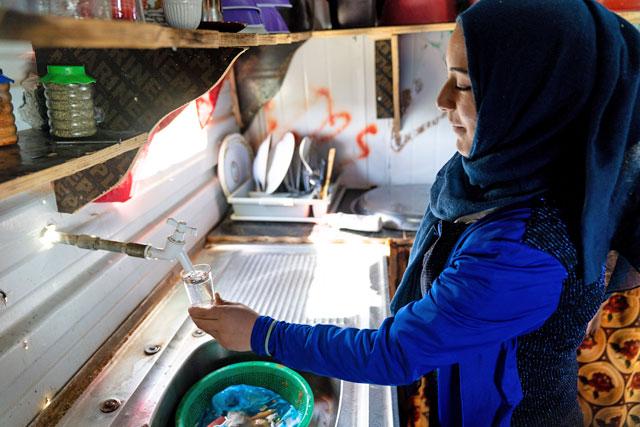You are here
UNICEF completes construction of water, sanitation network in Zaatari camp
By JT - Mar 18,2019 - Last updated at Mar 18,2019

In this undated photo, a resident of Zaatari camp pours a glass of water from the camp’s recently completed water sanitation network (Photo courtesy of UNICEF)
AMMAN — UNICEF has recently completed the construction of a sustainable water and sanitation system in Zaatari refugee camp, which will provide a sustainable source of clean water and safe sanitation for nearly 80,000 people, including 45,000 children, according to a statement sent by UNICEF.
“We used to go and fill up our buckets with water from the public taps and sometimes the trucks. When the trucks came... it would get really crowded,” said Amina, whose last name was not given in the statement and who lives in the last district to be serviced by the new systems.
UNICEF said Amina has lived in Zaatari along with her children and grandchildren since 2012.
Every household now has a toilet connected to the wastewater system, providing safety and dignity to girls, women and all residents in the camp, according to the statement, which added that that UNICEF and its partner have also installed accessible toilets for children and adults with disabilities.
“I use water to support my family for all their needs — for the toilet, baths, dishwashing, cleaning, laundry, cooking and for everything really. Because water is life,” Amina said.
With the completion of the water network, 35 litres of safe drinking water are provided directly to the homes of each family member living in the camp.
The construction project was undertaken by UNICEF, with the support of the Ministry of Water and Irrigation, and was built in several stages. It was completed thanks to a donation from Germany, in addition to funding from Canada, the UK and the US.
According to the statement, the new network has reduced operating costs by over 66 per cent and eliminates the need for water trucks.
“Ending the reliance on trucking for water and wastewater provision is not only cost-effective, it has also ensured a more equitable distribution of the services for families,” UNICEF Jordan Representative Robert Jenkins explained.
Amina’s grandson Diaa, who is 10 years old and has lived in the camp since he was four said “we used to go far over there, far away, where the water was... We had jerry cans and buckets and would go fill them up...It would take us an hour to bring the water all the way home”.
“But now we have no worries. We can sit in our homes, play, do our school work and have access to water anytime,” added Diaa.
Related Articles
Six members of the German parliamentary group “Arabic Speaking Countries in the Middle East” recently visited the Zaatari Refugee Camp, a UNICEF statement said.
UNICEF said on Thursday it launched the construction project of a water distribution network in the Zaatari Refugee Camp.
AMMAN — The second phase of the construction works for the water and wastewater network at Zaatari Refugee Camp in Mafraq was launched on We
















